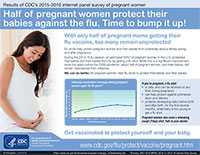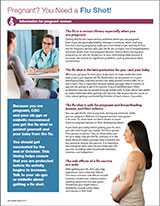Pregnant Women & Influenza (Flu)
On This Page
Flu is more likely to cause severe illness in pregnant women than in women who are not pregnant. Changes in the immune system, heart, and lungs during pregnancy make pregnant women (and women up to two weeks postpartum) more prone to severe illness from flu, including illness resulting in hospitalization. Flu also may be harmful for a pregnant woman’s developing baby. A common flu symptom is fever, which may be associated with neural tube defects and other adverse outcomes for a developing baby.
The Flu Shot is the Best Protection Against Flu
Getting a flu shot is the first and most important step in protecting against flu. The flu shot given during pregnancy has been shown to protect both the mother and her baby for several months after birth from flu. Studies in young healthy adults show that getting a flu shot reduces the risk of illness by 40% to 60% during seasons when the flu vaccine is well-matched to circulating viruses. There also are studies that show that a baby whose mother was vaccinated during her pregnancy is protected from flu infection for several months after they are born, before the baby is old enough to be vaccinated. Pregnant women should get an inactivated influenza vaccine (flu shot); the nasal spray vaccine should not be given to women who are pregnant. Learn more about the flu vaccine.
A Long Record of Safety for Flu Shots in Pregnant Women
Flu shots have been given to millions of pregnant women over many years with a good safety record. There is a lot of evidence that flu vaccines can be given safely during pregnancy; though these data are limited for the first trimester. CDC and ACIP recommend that pregnant women get vaccinated during any trimester of their pregnancy. It is very important for pregnant women to get the flu shot. See Seasonal Flu Vaccine Safety and Pregnant Women for more information.
Other Preventive Actions
In addition to getting the flu shot, pregnant women should take additional everyday preventive actions.
Early Treatment is Important for Pregnant Women
If you get sick with flu symptoms call your doctor right away. There are antiviral drugs that can treat flu illness and prevent serious flu complications. CDC recommends prompt treatment for people who have influenza infection or suspected influenza infection and who are at high risk of serious flu complications, such as pregnant women.
- Treatment should begin as soon as possible because antiviral drugs work best when started early (within 48 hours after symptoms start).
- Antiviral drugs can make your flu illness milder and make you feel better faster. They may also prevent serious health problems that can result from flu illness.
- Oral oseltamivir is the preferred for treatment of pregnant women because it has the most studies available to suggest that it is safe and beneficial.
- Antiviral drugs require a prescription from your doctor.
- Having a fever caused by flu infection or other infections early in pregnancy may be linked to birth defects in a baby. In addition to taking antiviral drugs, pregnant women who get a fever should treat their fever with Tylenol® (or store brand equivalent) and contact their doctor immediately.
When to Seek Emergency Medical Care
If you are pregnant and have any of these signs, call 911 right away:
- Difficulty breathing or shortness of breath
- Pain or pressure in the chest or abdomen
- Sudden dizziness
- Confusion
- Severe or persistent vomiting
- High fever that is not responding to Tylenol® (or store brand equivalent)
- Decreased or no movement of your baby
Note: There is no recommendation for pregnant women or people with pre-existing medical conditions to get special permission or written consent from their doctor or health care professional for influenza vaccination if they get vaccinated at a worksite clinic, pharmacy or other location outside of their physician’s office. For more information, visit Misconceptions about Seasonal Flu and Flu Vaccines.
Fact Sheet
Additional Resources for Pregnant Women
- Pregnant Women: Answers to Common Questions about the Flu Vaccine [Streaming, 5 min 43 sec]
- Preventing Flu During Pregnancy, A Cup of Health with CDC (3 MB, 3 min 38 sec)
- Preventing Flu During Pregnancy, A Minute of Health with CDC (1 MB, 59 sec)
- Flu Vaccination Videos for Kids, Parents and Pregnant Women
- Letter to Providers: Influenza Vaccination of Pregnant Women (October 9, 2014)[324 KB, 2 pages]
- New England Journal of Medicine Perspective, “2009 H1N1 Influenza and Pregnancy — 5 Years Later”
- ACIP Recommendations: Influenza Vaccination for Pregnant Women*
*Information included in the 2013-2014 ACIP seasonal influenza recommendations regarding the use of influenza vaccines in pregnant women should be considered current for the 2015-2016 influenza season.
- Page last reviewed: August 25, 2017
- Page last updated: October 6, 2017
- Content source:
- Centers for Disease Control and Prevention, National Center for Immunization and Respiratory Diseases (NCIRD)
- Page maintained by: Office of the Associate Director for Communication, Digital Media Branch, Division of Public Affairs


 ShareCompartir
ShareCompartir

